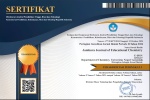Validation of Environmental Chemistry LKM Based on The Mangrove Ecosystem to Pre-Service Students'
Abstract
Keywords
Full Text:
PDFReferences
Amila, A., Suyatna, A., & Herlina, K. (2018). Practicality and effectiveness of student'worksheets based on ethno science to improve conceptual understanding in rigid body. International Journal of Advanced Engineering, Management and Science, 4(5), 400-407.
Eilks, I., Gulacar, O., & Sandoval, J. (2018). Exploring the Mysterious Substances, X and Y: Challenging Students' Thinking on Acid-Base Chemistry and Chemical Equilibrium. Journal of Chemical Education, 95(4), 601-604. https://doi.org/10.1021/acs.jchemed.7b00404
Eilks, I., & Hofstein, A. (2015). Relevant Chemistry Education, From Theory to Practice. Sense Publisher.
Ekaputra, F., & Widarwati, S. (2023). Discovery Learning Based Practicum Learning in Improving Critical Thinking Skill and Student Creativity. Tarbiyah : Jurnal Ilmiah Kependidikan, 12(1), 47-56.
Forbes, C. T., Neumann, K., & Schiepe-Tiska, A. (2020). Patterns of inquiry-based science instruction and student science achievement in PISA 2015 Patterns of inquiry-based science instruction and student science achievement in PISA 2015. International Journal of Science Education, 0(0), 1-24. https://doi.org/10.1080/09500693.2020.1730017
Irawati, R. ., & Sofianto, E. W. . (2019). Pengembangan Worksheet Materi Asam Dan Basa Menggunakan Model POE Berbasis Potensi Lokal Kalimantan Selatan. Jurnal Inovasi Pendidikan Kimia, 13(2), 2370-2382.
Lestari, N., Basri, I., Yusuf, S. M., Suciati, & Masykuri, M. (2019). Effect of Interactive Multimedia Based on PBL on Critical Thinking Ability and Science Literacy VII Junior High School Student at Kupang. 6th ICRIEMS Proceedings, BE1-BE8.
Pamungkas, A., Subali, B., & Linuwih, S. (2017). Implementasi model pembelajaran IPA berbasis kearifan lokal untuk meningkatkan kreativitas dan hasil belajar siswa. Jurnal Inovasi Pendidikan IPA, 3(2), 118-127.
Saija, M., & Beay, L. K. (2022). LKM Berbasis Inkuiri Terbimbing Untuk Meningkatkan Pemahaman Konseptual dan Motivasi Belajar Kimia. Jambura Journal of Educational Chemistry, 4(1), 1-7. https://doi.org/10.34312/jjec.v4i1.13492
Saija, M., Rahayu, S., Budiasih, E., & Fajaroh, F. (2021). Empowering Students ' Worksheet with SSI to Improve the Conceptual Understanding of Rate Reaction and Thermochemistry. Advances in Social Science, Education and Humanities Research, 528, 231-237. https://doi.org/https://dx.doi.org/10.2991/assehr.k.210305.034
Setiawan, A. (2020). Pengembangan Pembelajaran IPA Berbasis Kearifan Lokal untuk Meningkatkan Kemampuan Berpikir Kritis. Jurnal Pendidikan IPA Indonesia, 9(1), 59-70.
Simamora, R. E., & Saragih, S. (2019). Improving Students' Mathematical Problem Solving Ability and Self-Efficacy through Guided Discovery Learning in Local Culture Context. International Electronic Journal of Mathematics Education, 14(1), 61-72.
Siswanto, J. (2018). Pengembangan Bahan Ajar Menulis Puisi Berbasis Kearifan Lokal untuk Siswa Kelas VIII SMP. Jurnal Cendekia: Jurnal Pendidikan Matematika dan Ilmu Pengetahuan Alam, 2(2), 166-176.
Sombria, K. J. F., Celestial, D. L., Jalagat, C. G. M., & Valdez, A. G. (2023). Online learning through Google Classroom: Effects on students critical thinking skills in chemistry. ASEAN Jpurnal of Science and Enggineering Education, 3(2), 193-210. http://dx.doi.org/10.17509/xxxx.xxxx
Sudarmin, S., Zahro, L., Pujiastuti, S. E., Asyhar, R., Zaenuri, Z., & Rosita, A. (2019). The development of PBL-based worksheets integrated with green chemistry and ethnoscience to improve students' thinking skills. Jurnal Pendidikan IPA Indonesia, 8(4), 492-499. https://doi.org/10.15294/jpii.v8i4.17546
Sukardi, R. R., Sopandi, W., Riandi, Aila, R. V., Sriwulan, W., & Sutinah, C. (2022). What is your chemical creation to overcome environmental pollution? Students' creative ideas on the RADEC learning model. Moroccan Journal of Chemistry, 10(3), 476-487. https://doi.org/10.48317/IMIST.PRSM/morjchem-v10i3.33076
Sumardi. (2019). Pengembangan Bahan Ajar Menulis Puisi untuk Siswa Kelas VII SMP. Lentera Pendidikan: Jurnal Ilmu Tarbiyah dan Keguruan, 22(2), 194-203.
Wahyudiati, D. (2022). Critical Thinking Skills and Scientific Attitudes of Pre-Service Chemistry Teachers Through the Implementation of Problem-Based Learning Model. Jurnal Penelitian Pendidikan IPA, 8(1), 216-221. https://doi.org/10.29303/jppipa.v8i1.1278
Wahyuni, A. L. E., Arrohman, D. A., Wilujeng, I., Widowati, A., & Suyanta. (2022). Application of integrated STEM-based student worksheet local potential of Pagar Alam Tea Plantation to improve students' environmental literacy. Jurnal Penelitian Pendidikan IPA, 8(3), 6-11. https://doi.org/10.29303/jppipa.v8i3.1260
Widianingsih, I. (2019). Peningkatan Hasil Belajar IPA dengan Pendekatan Saintifik Berbasis Kearifan Lokal. Jurnal Penelitian Pendidikan IPA, 5(1), 74-82.
DOI: https://doi.org/10.37905/jjec.v6i1.21112
Refbacks
- There are currently no refbacks.
Editorial Office

|
Department of Chemistry, Universitas Negeri Gorontalo |

|
E-mail: [email protected] |

|
|

|
Jambura Journal of Educational Chemistry (p-ISSN: 2655-7606 | e-ISSN: 2656-6427) by Department of Chemistry Universitas Negeri Gorontalo. This work is licensed under a Creative Commons Attribution 4.0 International License. Powered by Public Knowledge Project OJS |










